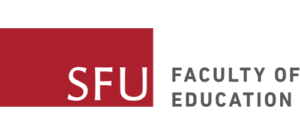On Saturday, October 19, we kicked off the first session of the Imaginative Schools Network (ISN) symposium series. In this symposium series co-hosted by the Centre for Imagination in Research, Culture and Education (CIRCE) and the Centre for Educational Leadership and Policy (CSELP) at Simon Fraser University, a team has been formed to investigate the role of imagination in public education, including its contributions to school leadership, teaching, learning, teacher/leader development, school culture and Reconciliation.
The ISN team includes school leaders and imaginative educators from local school districts, representatives from SFU’s Beedie School of Business, local business owners and graduate students enrolled in SFU’s Imaginative K-12 Leadership and Imaginative Education Masters’ cohorts.
10:00 AM Saturday morning…The room was buzzing as participants worked in small groups to investigate key questions around the nature of imaginative leaders and leadership. Fueled by coffee, treats and imaginative challenges, participants in the first symposium addressed three dimensions of imaginative leadership—dispositions, skills/actions and growth. Each “round” of questions was designed to be highly interactive and meaningful, employing cognitive tools that engaged participants’ imaginations with each topic for discussion. A glimpse:
Round One involved humanizing the meaning of “imaginative” leadership by identifying real-world people that envision the possible and enact it in their leadership work. Participants played “cards”–identifying and ranking the “heroic” qualities that define these imaginative leaders.
Round Two was a change of context: It was 2060. Participants were challenged to provide a history of the future of education: What are the skills/actions imaginative educational leaders in 2060 demonstrate in their imaginative schools?
Round Three required participants to re-imagine how educational leaders professionally develop. What is required to grow the imaginations of leaders in schools? What do leaders need to know/do to grow the imaginations of their school communities? How can leaders sense of agency be amplified in this direction?
Our Mission
Drawing on the perspectives of experienced school administrators, teachers and edu-entrepreneurs—along with over three decades of research on the theory and practice of Imaginative Education—the project team is working to collaboratively develop a set of standards for imaginative schools. While we hope that these standards will be used to develop and support a BC Imaginative Schools Network, they can support education in a range of ways. For example, the standards for imaginative schools we develop may be used
- as a basis for reviewing school or district-level goals, policies and practices with regard to curriculum and pedagogy;
- to clarify and guide appropriate educational leadership practices that seek to develop and support imagination in schools;
- to guide the preparation and orientation of teachers in ways that help them attend to the imaginative well-being of their students;
- to help identify imaginative teaching practices that are adaptable to various curriculum areas, class compositions, cultural contexts, etc;
- to devise appropriate means of assessing and providing formative feedback on student and teacher performance as it relates to imagination;
- to strengthen efforts to embed Indigenous perspectives, histories and ways of knowing in teaching the provincial curriculum;
- to help parents and families understand school purposes and practices and their connections with home/family environment and approaches to parenting;
- as criteria against which to evaluate educational programs that may be offered or recommended to schools, teachers and parents.
Future Topics
Symposium 2 (February, 2020): Imaginative teaching: How do teachers learn to teach imaginatively? What kinds of professional learning opportunities support teachers’ development as imaginative educators and what feedback do they need? How can different approaches to imaginative teaching be evaluated and shared?
Symposium 3 (May, 2020): The imaginative school in context: What kinds of relationships do imaginative schools have with their families and communities? How do imaginative schools work collectively on such issues as curriculum, scheduling, use of space? What is the culture of imaginative schools?
Symposium 4 (July, 2020): Imaginative schools and the BC curriculum: What is the role of imagination in integrating Indigenous perspectives and knowledge across subject areas? What is the role of imagination in place-based education?
Stay tuned for updates and connect with us.

